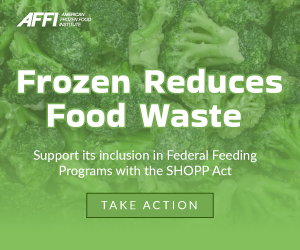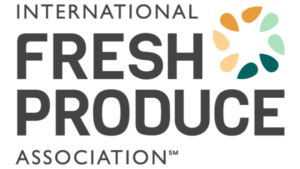Food Safety Forum
Home » Food Safety Forum Speaker Bios
Using Science to Frame Policy for Foodborne Non-Cultivable Pathogens
Wednesday, September 21, 2022
11 AM – 2:30 PM EDT

We are excited to hear these experts speakers from across academia, government and the food industry.
Welcome and Introduction: Non-Cultivable Pathogens in the Food Supply
Dr. Donna Garren is the Executive Vice President of Science and Policy for the American Frozen Food Institute (AFFI). Her extensive background and expertise in food safety, food science, nutrition and regulatory affairs are instrumental in building and enhancing strong and effective regulatory programs for the food and beverage industry. Prior to joining AFFI, Dr. Garren was the President and General Manager for NSF Agriculture (formerly NSF Davis Fresh), a business unit of NSF International. Dr. Garren has also held senior food safety and health positions with The Consumer Goods Forum, National Restaurant Association and United Fresh Produce Association.
She earned her Doctor of Philosophy in Food Science and Technology from the University of Georgia and her Bachelor of Science in Food Science from Clemson University.
Dr. Jennifer McEntire is the Chief Food Safety and Regulatory Officer for the International Fresh Produce Association, the successor to the United Fresh Produce Association. A food microbiologist by background, she has worked in the Washington, DC area for over 20 years, bringing the scientific perspective to food safety regulatory issues. She has held previous food safety leadership positions with the Grocery Manufacturers Association, The Acheson Group and the Institute of Food Technologists.
McEntire earned a PhD from Rutgers University as a USDA National Needs Fellow in Food Safety and received a Bachelor of Science with Distinction, magna cum laude, in food science from the University of Delaware. She serves on several food safety related industry and academic advisory boards, is on the technical committee of the Center for Produce Safety, and was the 2020 recipient of the NSF International Food Safety Leadership Award.
Current Science: Methods for Detection of Non-cultivable Pathogens in Foods
Dr. Lory Reveil is Senior Director of Scientific and Regulatory Affairs at the American Frozen Food Institute (AFFI). She earned her PhD in Microbiology from Cornell University and her Bachelor of Science from The University of New Mexico.
In her role at AFFI, Dr. Reveil represents and advocates for the frozen food industry before federal regulatory agencies and engages with the food industry on important policy priorities.
Dr. Branko Velebit is the Principal Research Fellow in Food Microbiology at the Institute of Meat Hygiene and Technology, based in Belgrade, Serbia. He is also the Head of the Department of Microbiology and Molecular Biology. Dr. Velebit’s areas of work include:
- Research, Development, Validation and Application of Diagnostic Methods in Food Microbiology (Classical and Emerging Pathogens);
- Implementation of ISO 17025 requirements in Food Microbiology laboratory;
- Building up National Monitoring Plan on food-borne pathogens;
- Implementation of acquis communautaire in Serbian Food Processing Plants concerning Food and Process Hygiene;
- Organization of and participation in International Proficiency Testing in Food Microbiology;
- Scientific Representative of Serbia in European Reference Laboratories for food-borne viruses,
- Campylobacter and coagulase-positive staphylococci.
Dr. Velebit has both a PhD and a Master’s degree in Veterinary Sciences, as well as a Doctor of Veterinary Medicine, from the University of Belgrade.
Dr. Ynés Ortega is an Associate Professor at The Center for Food Safety at the University of Georgia. She received her undergraduate degree at the Universidad Peruana Cayetano Heredia (UPCH), Doctorate in Microbiology and Immunology at the University of Arizona and MPH in International Health from Johns Hopkins University. She is a visiting professor at UPCH. Her research is focused on food and waterborne pathogens.
She is currently studying the dynamics of disease transmission that take place in the production and processing of food products. Dr. Ortega’s research evaluates detection assays used in food production that are sensitive and specific for pathogenic parasites in both biological and environmental samples, in domestic and international setting. She has also expanded her efforts to the development and testing of disinfectants for use in fresh produce and to the study of risk factors associated with parasitic foodborne transmission. Dr. Ortega has been a science advisor for 9 years for FDA-SRL, has authored many peer-reviewed manuscripts and book chapters, and is editor of 3 books on Foodborne Parasites.
Risk Assessment Considerations: Detection of Non-Cultivable Pathogens in Food
Risk Assessment Considerations: Detection of Non-Cultivable Pathogens in Food
Prior to joining AFFI, Dr. Gummalla was the vice president of product development at Zentis NA, a global fruit preparation manufacturer. His technical expertise extends to flavor development, food microbiology, and product development resulting from managing global food application projects at Givaudan Flavors and leading the global dairy flavor research and development portfolio at Cargill.
Dr. Gummalla currently serves on key committees representing the industry, he is an advisor on the U.S. Agricultural Trade Advisory Committee for Processed Foods, a committee member on IAFP’s Journal of Food Protection, President of the Capital Area Food Protection Association, and chair of the International Food Science Certification Commission which administers IFT’s Certified Food Scientists program.
On the food safety front, he is a Preventive Controls Qualified Individual instructor and served as adjunct assistant professor at the University of Cincinnati, where he taught food microbiology. Early in his career, he was a post-doctoral researcher at the U.S. Food and Drug Administration (FDA) representing FDA’s foray in to nanotechnological applications for food safety. He holds a Ph.D. in Nutrition and Food Sciences from Utah State University.
Dr. Lucy Robertson currently heads the parasitology team at the Faculty of Veterinary Medicine, Norwegian University of Life Sciences (NMBU). Among other projects in the group, there is considerable focus on One Health and transmission of parasites, especially those that are zoonotic, via food and water, and their lab is the national reference lab for parasites in water and fresh produce.
This resulted in her leading a COST Action on foodborne parasites (Euro-FBP; 2015-2019), as well as being involved in various other initiatives concerned with food/water-borne parasites, both in Europe and elsewhere (Asia, Caribbean, South America, and Africa). Among other tasks, she participated in the FAO/WHO multi-criteria-based ranking in 2012, served a term (2015-2018) as a member of the BioHaz Panel of the European Food Safety Authority, and was a member of the team developing the ISO protocol for analysis of fresh produce for Cryptosporidium and Giardia. She is currently a member of the WHO Foodborne Disease Burden Epidemiology Reference Group.
The research scope of the parasitology group at NMBU continues to have considerable focus on One Health and foodborne transmission of parasites, and Dr. Roberston remains an enthusiastic champion of parasites, the neglected pathogens, and ensuring that they remain on the agenda.
Dr. Lee-Ann Jaykus is a William Neal Reynolds Professor in the Department of Food, Bioprocessing, and Nutrition Sciences at North Carolina State University. Her formal training is in Food Safety/Food Microbiology (Purdue University) and Environmental Sciences/Public Health (the University of North Carolina at Chapel Hill). Dr. Jaykus is probably best known for her efforts in food virology, having served as the scientific director of the USDA-NIFA Food Virology Collaborative (NoroCORE project) for over 7 years.
She has 30 years of experience training undergraduate and graduate students in food microbiology; leading food safety research projects; and working with external stakeholders in the food and beverage industry, sanitation and hygiene sector, and with cruise lines.
Her professional activities have included membership on the National Advisory Committee on Microbiological Criteria for Foods (NACMCF); participation in several National Academies consensus studies and as a member of the Food and Nutrition Board; and as a member of the executive board of the International Association for Food Protection (IAFP), for which she served as president in 2010-2011.
Assessing Public Health Risk: Intersection of Current Science and Regulatory Policy
Elizabeth Fawell is a Partner with Hogan Lovells, where she practices in the Global Regulatory group. Ms. Fawell has worked with every segment of the food industry, including manufacturers, distributors, retailers, restaurants, and food service operators, as well as their trade associations. Her work on behalf of food industry clients with the Food Safety Modernization Act (FSMA) since its inception and her understanding of Hazard Analysis Critical Control Point (HACCP) systems provides her with the experience and perspective needed to counsel clients on how to comply with new requirements under the law. Ms. Fawell is also a Preventive Controls Qualified Individual (PCQI) and has completed the FSPCA PCQI training.
Ms. Fawell helps clients stay informed of and ahead of public policy issues and develops strategies for effective advocacy before regulators. She earned her J.D. from the Northwestern University School of Law. She is a member of the Food and Drug Law Institute’s Food and Dietary Supplements Committee.
Dr. Tim Jackson is a Senior Science Advisor for Food Safety at the Center for Food Safety and Applied Nutrition, where he supports programs in outbreak investigation, root cause analysis and prevention strategies.
From 2017 to 2021, as Vice President of Food Safety, Regulatory and Social Compliance, he led the Driscoll’s team in North and South America responsibility for food safety, regulatory (including organic) compliance and compliance in worker welfare.
Prior to starting at Driscoll’s, Dr. Jackson was the Director of Food Safety for Nestlé US and Nestlé Canada, with responsibility for thermal processing and food safety programs in hygiene, microbiology, allergens and chemical contaminants. He held this position since 2009. He has worked for Nestlé as a research and industrial microbiologist since 1995 as a research associate, head of the microbiology department of Nestlé’s reference laboratory for the US and Canada and from 2004 to 2008 as Microbiology Advisor to Corporate Quality Management for Nestlé world-wide.
Dr. Jackson received his Bachelor of Science in Biology from Abilene Christian University and his Master of Science and Ph.D. in Food Microbiology from Texas A&M University. While at the University, he led the university administered training program for USDA-FSIS inspectors at the Agency’s newly established training center. He currently serves on the technical committee of the Center for Produce Safety.
Dr. Neda Nasheri is a Research Scientist with Health Canada with the Bureau of Microbial Hazards, and also serves as the Head of the Food Virology Laboratory. In this role, she pursues research on a variety of foodborne viruses, and runs a reference service for detection of viruses in food, clinical and environmental samples. She is also an adjunct professor at the Faculty of Medicine, University of Ottawa. Her research interests and projects include detection, genomic characterization, inactivation, and transmission of viruses.
Dr. Nasheri earned her PhD and Master’s degree in Microbiology and Immunology at the University of Ottawa, studying different viruses such as mumps, and hepatitis C virus. During her post-doctorate studies, she worked on foodborne viruses such as hepatitis A, E and norovirus.
Mr. Joseph Reardon currently serves as the Senior Director of Food Safety Programs for the National State Departments of Agriculture. In this role, he works with all 50 Commissioners, Directors and Secretaires of Agriculture on food safety related issues.
He previously served as the Assistant Commissioner for Consumer Protection for the North Carolina Department of Agriculture & Consumer Services, where he oversaw the divisions responsible for food safety, agricultural emergency response, animal health and regulation of the structural pest control industry, pesticide use and various weighing and measuring devices. He also served as Senior Advisor for Federal-State Relations and Director for the Division of Federal-State Relations in the Office of Regulatory Affairs of the FDA. In these roles, he worked collaboratively with Federal, State, local, tribal, and territorial partners to enhance the public health infrastructure and increase the safety of food and feed.
Prior to joining the FDA, Mr. Reardon served the North Carolina Department of Agriculture & Consumer Services for more than 28 years in various regulatory positions, including as the Director of the Department’s Food and Drug Protection Division and Special Assistant to the Commissioner of Agriculture for Food and Agriculture Projects.
He is the co-author of several national articles including Histamine Poisoning in Tuna Burgers and Outbreak of Listeriosis among Mexican Immigrants as a result of Consumption of Illicitly Produced Mexican-Style Cheese. Mr. Reardon holds a degree in Food Science from North Carolina State University.
Dr. Trevor Suslow is a consultant with Trevor Suslow Consulting, LLC and Professor Emeritus of Cooperative Research with the University of California, Davis. He also served as Vice President of Produce Safety with the Produce Marketing Association. His former full-time position at UC Davis included statewide responsibilities in quality and safety of perishable horticultural commodities. Dr. Suslow’s program spanned preharvest to postharvest research and outreach education on diverse whole fresh and minimally processed horticultural foods from annual row crops to tree and vine commodities.
Dr. Suslow received his Ph.D. in plant pathology from the University of California, Berkeley. Before joining UC Davis, he was a Research Scientist and Director of Product Research for DNA Plant Technologies, Inc. for 15 years.
Dr. Suslow was recognized by the International Association of Food Protection (IAFP) with the 2018 Elmer Marth Educator Award and in 2019 the IAFP President’s Award for Extension and outreach to the food safety community.
Dr. Sophie Zuber is an Expert in Food Virology and works as an R&D Food Safety Microbiologist and Virus Issue Manager at Nestlé Research, based in Lausanne, Switzerland. Dr. Zuber received her PhD in microbiology from the Department of Genetics, University of Melbourne, Australia. She is tri-lingual (English, German, French) and has over 15 years of project management experience in industry.
In her current position, her principal responsibilities include providing scientific advice and guidance on possible risks of viruses in the food chain. Dr. Zuber leads a work program to control and manage the virus risk within Nestlé and shapes the Nestlé strategy regarding issues and opportunities related to viruses and bacteriophages. In this context, Dr. Zuber has published peer-reviewed publications focusing on the effects of thermal and alternative treatments used in food processing on viruses and bacteria and on the monitoring of foodborne viruses in the food chain.






















